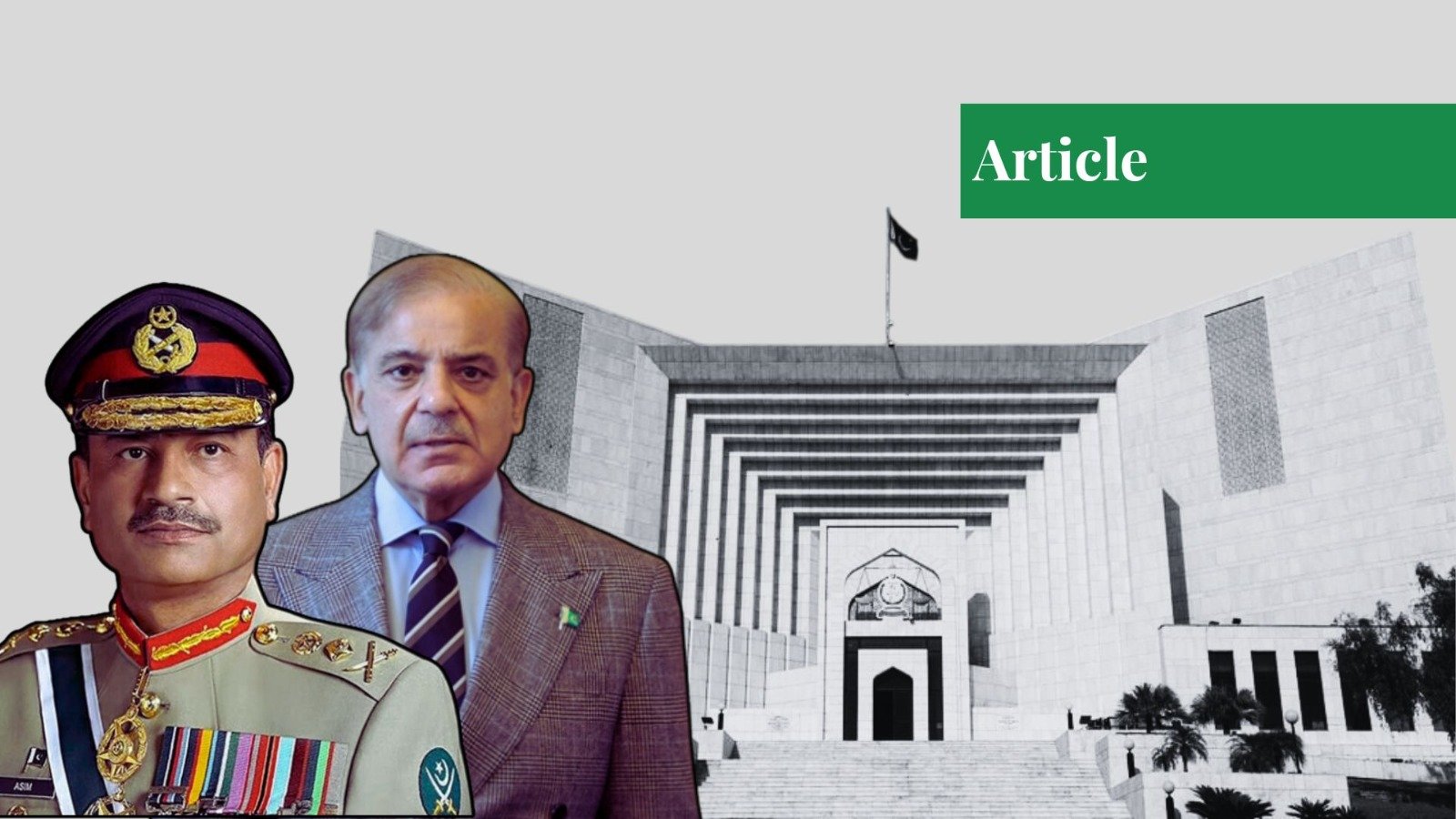An intense debate has sparked in Islamabad since the proceedings around the passing of the 27th constitutional amendment began. Moved by Law Minister Azam Nazeem Tarar, the bill received a two-thirds majority in both the upper and lower houses of the Parliament. The bill is aimed primarily at overhauling the military command structure, revising judicial arrangements, and adjusting federal-provincial relations. While the governing coalition has argued the necessity of the amendment to improve governance, critics fear it will place the judiciary under executive control, further eroding Pakistan’s already dwindling judicial independence.
The Amendment And Its Key Proposed Changes
Under Article 239 of the Constitution of Pakistan, any amendment must secure a two-thirds majority in both the Senate and the National Assembly. The government leveraged its coalition strength to advance the bill rapidly, with the Senate approving the 27th Amendment on November 11, 2025, by a 64-0 vote following an opposition walkout. The National Assembly session followed on November 12th, with the bill gathering 234 votes. With amendments proposed by the National Assembly currently under review in the Senate, the amendment is just short of presidential assent to become law.
Some of the key changes proposed by the amendment include establishing the Federal Constitutional Court (FCC), a new apex court separate from the Supreme Court, which will handle constitutional interpretation and intergovernmental disputes. Its decisions will be binding on all courts, including the Supreme Court of Pakistan. The FCC’s Chief Justice will serve a fixed term, with retirement age increased to 68 as compared to 65 for the Supreme Court. The amendment has also restructured the judicial appointment process under Articles 199-200 to increase federal input; for example, the senior-most Supreme Court judge will head the Judicial Commission and the Supreme Judicial Council. Provincial cabinets’ size limits are raised from 11% to 13% of assembly strength to increase representation.
Another key feature of the amendment is the military command restructuring, via the overhauling of Article 243. Under this amendment Army Chief will also serve as the Chief of Defense Forces (CDF), commanding the Army, Navy, Air Force, and strategic assets. The position of Chairman of the Joint Chiefs of Staff Committee (CJCSC) will be abolished after the incumbent retires. As a result, the Army Chief will now gain unprecedented power over all branches of the armed forces. The amendments will also constitutionally protect the five-star officers, i.e., Field Marshall, Air Force Marshal, and Admiral of the Fleet, by granting them lifetime rank, uniform, and privileges. In effect, General Asim Munir will gain permanent immunity from criminal prosecution and can only be removed by a two-thirds parliamentary vote.
Under the Provincial Fiscal Adjustments, the bill revises the National Finance Commission Framework, so that the guaranteed share of the provinces in the federal revenue would no longer be “protected” beyond the 57.5% share limit introduced by the 18th Amendment. This means that, citing reasons such as national emergencies, fiscal crises, or security needs, the constitutional protection of the provincial share can be relaxed, effectively rolling back fiscal federalism.
State Rationale Behind The Amendment
Voices from the government say that the amendment is addressing key administrative and legal bottlenecks. Information Minister Attaullah Tarar, for example, insisted in his parliamentary address that the constitution is “a living document in which [a] process of evolution continues,” and that the changes reflect international best practice. He further argued that the reforms would ensure good governance by bolstering national defense and strengthening ties between the federation and the provinces. Deputy Prime Minister Ishaq Dar defended the amendment, calling the establishment of a Constitutional Court a “historic step” for judicial improvement, vowing that “the seniority of existing Supreme Court judges and the Chief Justice will remain unaffected.” Government sources have further emphasized how the Federal Constitutional Court (FCC) will only relieve the Supreme Court’s caseload, and the merger of defense command under the army chief will only strengthen defense cohesion. Senate Chairman Syed Yousaf Raza Gilani, a coalition member, added that the amendment was developed in line with the 2006 Charter of democracy, reflecting a broad consensus within the ruling coalition.
There is a strong consensus among the government representatives on how a permanent constitutional court will help handle constitutional disputes and fundamental rights cases separately from the political cases. A legal advisor commenting on this told Al Jazeera how the FCC creates “focused expertise and timely adjudication” on constitutional matters. Similarly, on the issue of elevating the army chief to Chief of Defense Forces (CDF), proponents claimed that military command will be formalized under one leader, strengthening command and coordination without disrupting each service’s autonomy. Since the amendments also proposed to grant legal immunity to the president, commenting on this, Federal Minister Ataullah Tarar noted that this is a common practice globally.
Key Commentary On The 27th Amendment
The proposition of the 27th Amendment Bill has brought huge commentary and criticism along with it. Opposition parties and critics have labelled the bill as a power grab, with PTI, the largest opposition party, slamming it as a conspiracy against the Constitution carried out “in haste” without consultation. PTI Chairman, Gohar Ali Khan, even called these measures “Baku Amendments,” drawing attention to their unconstitutional nature, and calling the bill “an attack on the House” and on the constitution’s spirit. The opposition also criticized how the bill was shared too late with them, preventing proper scrutiny, with the JUI-F leader stating that his party would not endorse amendments drafted without broad political support and public input. An overall negative political sentiment has risen from the opposition, citing key reasons such as centralizing federal power at the expense of provinces and the creation of new legal immunities, which will ultimately undermine democracy.
Legal experts are equally alarmed at the impact this amendment will create on judicial independence. With a government-controlled FCC taking supreme constitutional authority, legal experts warn that the Supreme Court is being reduced to merely an appellate court. Similarly, commenting on the exceptional legal status granted to selected officials, a lawyer commented that “Democracy does not survive where impunity is made a constitutional right.” Another commentator referred to the amendment being a greater blow to our Constitution than past dictatorial amendments, calling it “tinpot dictatorship”. The Human Rights Commission of Pakistan also criticized the government’s haste and lack of broader political debate, raising questions on the very intention behind the amendment.
Conclusion
As the situation continues to unfold, analysts agree that the 27th Amendment will leave a lasting scar on democracy in Pakistan. The overall politico-legal sentiment is concerned about its effects on Pakistan’s already fragile political paradigm. With the passing of the amendment just in sight, the functional independence of Pakistan’s institutions stands at risk of erosion, reducing them to ceremonial symbols rather than autonomous pillars of democracy.
If you want to submit your articles and/or research papers, please visit the Submissions page.
To stay updated with the latest jobs, CSS news, internships, scholarships, and current affairs articles, join our Community Forum!
The views and opinions expressed in this article/paper are the author’s own and do not necessarily reflect the editorial position of Paradigm Shift.
Zainab Kashif is a bachelor's student of public administration at NUST, Islamabad. She is passionate about geopolitics and policy preparedness.



